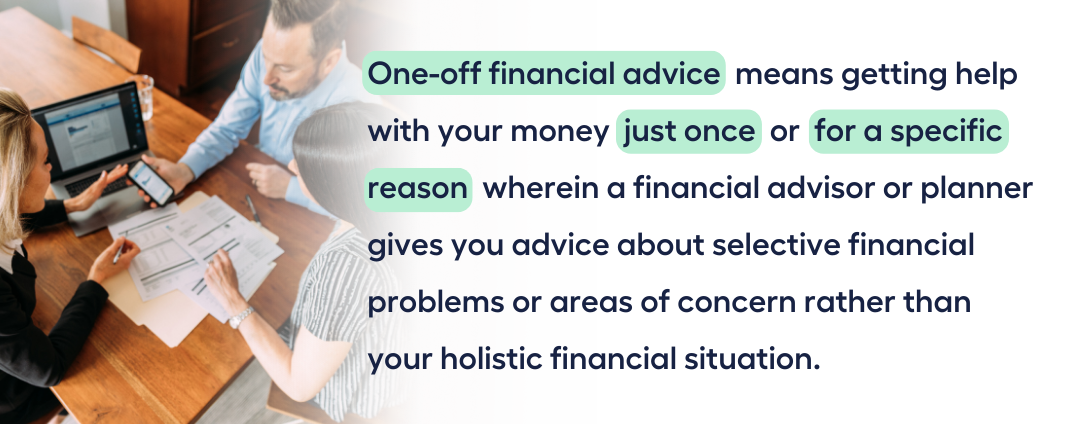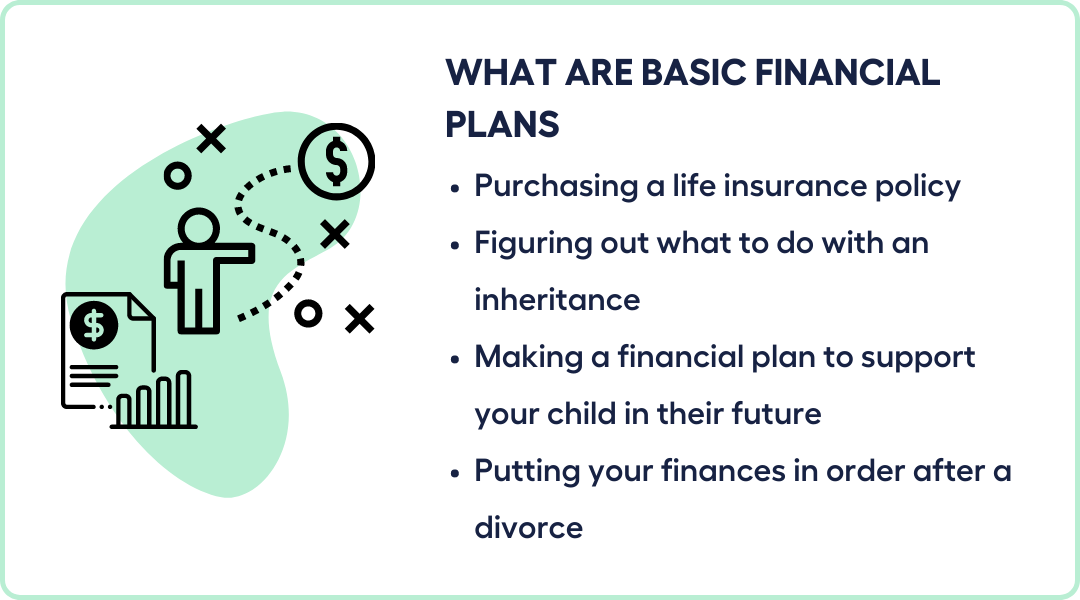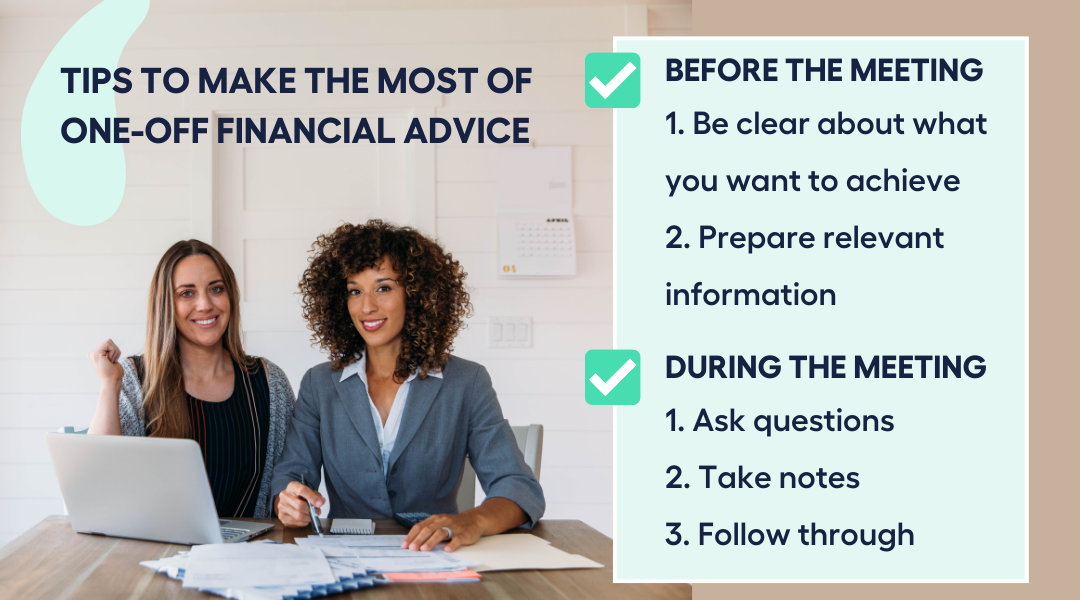Making smart decisions with your money can be like walking a tightrope, especially if you’re not sure where to start. This is why seeking one-off financial advice can be a pathway to getting valuable guidance on how to manage your finances.
But how do you make the most of that advice?

In this article, we’ll explore some practical tips and strategies to help you get the most value from your one-off financial advice and make informed decisions that may help improve your short-term and long-term financial well-being.
Whether you’re looking to budget and save for a big purchase, pay down debt, contribute to your retirement fund, or simply improve your overall financial health, this article will provide you with actionable advice that you can start using today.
Jump straight to…
What is One-Off Financial Advice?
One-off financial advice means getting help with your money just once or for a specific reason wherein a financial advisor (aka financial planner) gives you advice about selective financial problems or areas of concern rather than your holistic financial situation.

It’s not a long-term relationship with the advisor like ongoing financial planning. One-off financial advice is just a one-time financial plan to help with a specific financial concern.
It goes by a few different names, like situational advice, event-driven advice or episodic advice, but the idea is the same:
You get the advice you need without having to commit to ongoing advice.
Because they cannot afford it or do not understand its value, some people may not desire ongoing financial advice. However, getting fair, impartial financial advice might provide you peace of mind. Depending on what you require, you can select between general and personal financial advice.
General financial advice is not tailored to your personal situation or goals and how it affects you personally.
Personal advice is specific and tailored to you, and it’s given after considering your financial situation, objectives, and needs. This advice is documented in a written plan called a Statement of Advice (aka Financial Plan) by the Australian Securities and Investments Commission (ASIC).
For more details about the differences between general advice and personal advice, you can check out ASIC’s Regulatory Guide 244.
- It’s important to note that while one-off financial advice can be helpful in addressing immediate financial concerns, it may not provide a comprehensive and solid financial plan that takes into account ALL of a person’s financial needs and goals. As such, individuals may want to consider ongoing financial planning services to address their broader, long-term financial planning needs.
Is One-Off Financial Advice Fee Based?
Yes, one-off financial advice should be fee-based. Financial advisors charge a one-time fee for their advice and recommendations, and the cost can vary depending on the complexity of the advice and how long it takes to prepare and implement.
Typically, it’s free to attend an initial consultation to discuss your needs and the financial adviser will then provide information about the likely costs.
Some financial advisors charge an hourly rate, while other advisors charge a percentage of the assets under management if the client decides to implement the recommended strategies.
If you decide to go ahead with the advice, your adviser will tell you how much they will charge. You will get a written agreement before you have to pay anything.
The costs for financial advice usually include two main parts:
1. Statement of Advice (SOA) fee
This is a formal document that explains what your adviser recommends and what financial plan they suggest for you. The SOA fee depends on how complicated your situation is and it usually starts at a few thousand dollars. You can pay the fee yourself, or it can be deducted from your investments. Even if you don’t follow their advice, you still need to pay the SOA fee.
2. Implementation fee
This is a fee for putting the recommendations into action. The costs will vary depending on how complicated the plan is.
It is crucial to keep in mind that the cost of financial advice might vary based on the advisor, their professional experience, and the services offered. Therefore, before utilising your financial advisor’s services, it would be wise to go over fees and methods of payment with them.
Also, remember that anyone providing personal financial advice, as well as most general advice providers, must possess an Australian Financial Services (AFS) licence issued by the Australian Securities and Investments Commission (ASIC).
This licence authorises individuals or businesses to conduct a financial services business, which involves selling, advising, or dealing in financial products.
- It’s recommended to deal only with licenced entities as they offer better protection in case of any mishap, and you can access free dispute resolution services.
If you want to explore fee options with a one-off and licenced financial advisor, book a complimentary call with our team today!
Queries Best Suited to One-Off Financial Advice
Personal finance queries can vary widely in complexity and duration. Some financial queries require ongoing financial advice and monitoring, while others may be more suited for one-off financial advice.
One-off financial advice is typically best suited for specific, discrete financial issues that do not require ongoing support or monitoring.
For example:
- If you are considering taking out a mortgage, seeking advice on the most suitable loan product, or seeking guidance on a specific investment, a one-off financial plan may be an appropriate solution.
- In contrast, financial issues that require ongoing monitoring and support, such as wealth creation or retirement planning strategies, may require ongoing financial advice and support.
Let’s explore some of the best queries suited to one-off financial advice and how it can help you get on the path to financial wellness.
Personal Financial Advice
When you need direction on a particular financial issue or decision, one-off financial advice is appropriate for personal financial advice.
For example:
- A one-off financial plan with a financial advisor might provide you with the knowledge you need to make wise choices if you are having problems setting up a budget, paying down debt, or need to buy a life insurance policy.
If you are searching for a low-cost way to begin your personal financial planning, one-time financial advice can be helpful. You can spend money on a one-time plan to take care of your current needs rather than committing to a long-term relationship with a financial adviser.
Budgeting
One-off financial advice can be a suitable option for budgeting since it offers guidance on creating a personalised budget that works for you. With a financial plan from a financial advisor, you can gain insights into your spending habits, identify areas where you can cut back, and establish a plan to reach your financial goals.
Furthermore, budgeting is a task that many individuals can handle themselves with proper guidance. One-off advice can equip you with the basic tools and knowledge to manage your budget independently.
Basic Financial Plans
One-off financial advice can be a suitable choice for creating basic financial plans because it offers a targeted and cost-efficient solution for people who need help in designing a financial plan for their future.
Basic financial plans typically involve defining short-term and long-term objectives, recognising potential risks, setting up a budget, and creating a savings plan.

For example:
1. Purchasing a life insurance policy
If you have personal debt or people that are financially dependent on you, chances are that you will need life insurance to pay out your debts or provide for your loved ones should you pass away. Your financial advisor can help you calculate the best sum insured for your circumstances and find a policy suitable for your circumstances.
2. Figuring out what to do with an inheritance
If you’ve received a large inheritance and aren’t sure what to do with it, especially if you weren’t wealthy before, a financial advisor can help you figure out what to do with it.
3. Making a financial plan to support your child in their future
If you want to financially assist your child in the future, like paying for university fees, a financial advisor can help you create a plan to save and invest.
4. Putting your finances in order after a divorce
If you’re going through a divorce and need to reorganise your finances, a financial advisor can help you create a new plan for your future.
Since basic financial plans do not need continuous upkeep or monitoring, a single consultation with a financial advisor can provide the required direction to establish the plan, which the client can then execute independently.
Short Term Financial Goals
When it comes to your money, short-term financial goals are the small wins you aim to achieve in the next year or so (often between 1 and 3 years).
To make sure you reach these goals, it’s important to start by making a budget and writing down your goals. Having clear short-term goals that are specific, measurable, and time-bound can help you stay on track and make better financial decisions. Think of them as stepping stones to achieving your long-term financial dreams.
Examples of Short-Term Financial Goals
Your objectives during a short-term time period can look like the following:
- Create a budget that allows you to live within your means
- Set up a regular savings schedule.
- Buy a new vehicle
- Savings for a holiday
Overall, the suitability of one-off financial advice depends on the specific nature of the financial query and the level of ongoing support required to address the issue. It’s essential to seek advice from a qualified financial advisor who can help determine the most suitable approach to address your financial needs.
Looking for the right finance expert to help you determine if a one-off financial advice is fit for your personal circumstances?
Book a complimentary call with our team today to help you get started!
Tips to Make the Most of One-Off Financial Advice
If you’ve reached this far reading this article, it’s great to know that you’re seriously considering seeking financial advice!

Here are some tips to help you make the most of your one-off financial advice:
Before the Meeting
1. Be clear about what you want to achieve
Prior to meeting with a financial advisor, spend some time considering what specific questions you want to address or what financial objectives you want to reach. By doing this, you’ll be able to express your needs clearly and make sure the advice you get is relevant and appropriate for your circumstances.
2. Prepare relevant information
Before meeting with the financial advisor, gather all pertinent financial documents and information. Details about your earnings, expenses, loans, and investments may be included. By having this information available, the advisor will be better able to comprehend your circumstances and give you sound recommendations.
During the Meeting
1. Ask questions
Don’t be afraid to ask questions during your meeting with the financial advisor. If you don’t understand something they say, ask them to explain it in simpler terms. Also, don’t be afraid to ask for clarification if you’re unsure about any aspects of the advice you receive.
2. Take notes
Take notes so you can refer back to the advice later. This will help you remember the key points and ensure that you can follow through on any action items.
3. Follow through
Once you receive the advice, make sure you follow through on any action items. This might include setting up a budget, changing your investment strategy, or paying off credit card debt. Remember, the advice you receive is only useful if you put it into action.
When seeking one-off financial advice, it’s important to find a reputable and qualified financial advisor who can provide unbiased and independent advice. Be sure to ask questions and clarify any doubts you may have before making any financial decisions based on the advice you receive.
Finally, remember that one-off financial advice is just one step in your financial journey, and it’s important to continue to educate yourself and make smart financial decisions to achieve your goals.
Looking for a sense of reassurance and peace of mind with the guidance of an unbiased and impartial Financial Advisor?
Book a FREE 15 min Call or Send Us Your Questions!






